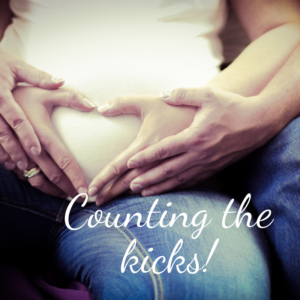Counting The Kicks

Each baby is a unique being with a unique personality. “Well, obviously,” you tell me. What I mean is this. Your baby’s personality can be expressed from the time of conception with kicks and movement.
It starts in the uterus. They let you know how they are and their actions inside you by kicking, resting, sleeping, and even hiccuping. When you pay attention, you can learn your baby’s habits, patterns, and personality. These movements can be their way to say “Hey out there, I am really enjoying this apartment!”
Research shows that babies that are doing well inside will react to external stimulation. So when you drop something and gasp they may jump with you. When you cry at a movie their heartbeat will match yours. https://www.ncbi.nlm.nih.gov/pmc/articles/PMC4460088/. This means that your baby is an active participant with you and their movements are proof that they are still healthy.
Your only cause for concern is when the baby’s movement drastically changes or stops. A baby in distress will actually stop moving normally. This is why kick counting or pattern monitoring is helpful.
If you are concerned about your baby’s movements. Follow these steps:
- Change your activities. If you have been up and moving, try lying down on your LEFT side. If you have been lying down try getting up and moving around.
- Drink something ice cold with sugar like a large cup of apple juice.
- Then lie back down on the left side, counting the kicks (or any fetal movement) over thirty minutes to 2 hours. Professionals used to recommend 10 kicks per hour. However, the recommendations have changed! All babies are different and move differently, and each mother should pay attention to her child’s patterns and not the number of kicks.
- Trust your intuition and if you still feel uncomfortable with your baby’s movements, call your provider. Never hesitate to call your provider.
Babies sleep for large parts of their day. So, doing kick counts 1-2 times a day can be a great way to check in on your baby. Try doing this exercise during the baby’s usually active and awake periods and not when they are normally sleeping. A baby’s movements can vary from 4 kicks to 100 kicks each hour. The more often you do this exercise, the more comfortable and accurate you will be.
Elizabeth Hutton, CEO of Kicks Count said “The movements differ with each baby and no set of movements is the same. As long as your baby is moving at a similar rate every day right up to birth, that is what counts.”
Learn more about kick counting at https://www.countthekicks.org/how-to-count-kicks/

